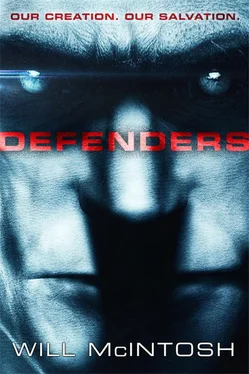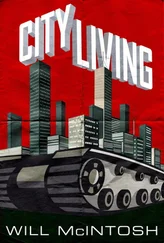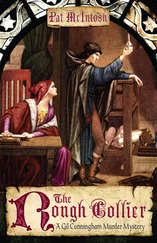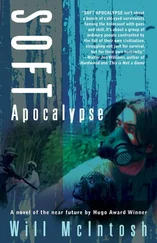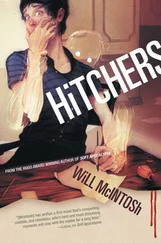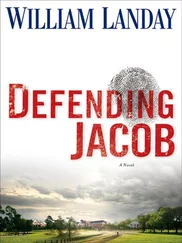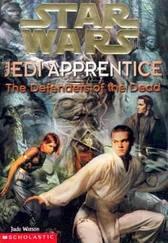Three Luyten flying in modified Harriers appeared high over the rooftops. They hovered there as the Tasmanian devil played out, then two swooped down, fired wall-busters point-blank at the window where the Tasmanian devils originated. The side of the building erupted, spewing concrete and steel into the street. Both airborne Luyten were hammered with small-arms fire. They were cut to pieces before their aircraft had time to fall out of the air and crash, one of them taking a chunk out of a building before dropping to the sidewalk, the other tumbling and spinning down the center of a street.
The Luyten kept coming, probing for a breach in the perimeter, firing captured human-shoulder-launched rockets that blew sections off the old buildings, their snipers waiting patiently for the soldiers to grow the least bit careless. The soldiers were using right-angle rifles with electronic sights to shoot without exposing themselves, because even before they poked a head out, the Luyten would know it was coming and blow it to chunks.
Oliver opened his mouth to ask what the hell the defenders were waiting for, when the first few stormed into view. At that moment he realized what they were planning, and wondered if he was the last person in the room to catch on. They’d been waiting for the Luyten to pin themselves against the human defenses. They came with weapons blazing, screaming in maniacal rage. Luyten spun to engage them.
Immediately, a Luyten fell, two of its limbs blown off. It twitched and scrabbled on the pavement as if trying to right itself, then lay still.
“A pincer maneuver,” Oteri said, seeming to relish her role as the room’s military authority. “Perfect for this situation.”
“The Luyten had to know it was coming,” Ariel said. “Every human in the area is a set of eyes for them.”
“But what choice did they have?” Oliver said. “They could have hung back, chased the defenders around the city, but their best chance to destroy the production facility was to get there before—”
Wood shushed him. Oliver shut up.
A defender’s legs glowed red, then blackened. Writhing in agony it crashed to the ground, its head all but crushing a minivan as it landed. A second defender was firing blasts from its forearm-mounted weapon while pressing his other hand against a badly bleeding chest wound.
The humans continued to engage the Luyten, their fire tightly contained to avoid hitting defenders.
The Luyten were falling faster than Oliver could track; black blood was everywhere. Defenders pressed forward, spraying the Luyten with bullets, tearing them to shreds.
Moving as one, the Luyten surged forward, storming the defenders’ position, trying to escape the trap they were in. The defenders fell back, letting them come. They waited until the Luyten were almost on top of them, then, shrieking, eyes wild, they attacked the Luyten close in, using their bladed limbs to slash Luyten open. The Luyten couldn’t match the giants in hand-to-hand combat, and had trouble firing weapons with the defenders so close; their heat guns roasted as many Luyten as defenders as they tried to repel the onslaught.
Within a few minutes, all of the Luyten lay dead. At least half the defenders—Oliver estimated sixty or seventy—were dead or wounded as well.
The war room had gone silent during the final battle, but now President Wood raised his face toward the ceiling and let out an undulating whoop, part Native American war cry, part coyote howl.
People exchanged hugs and high-fives, but only briefly, because there were eleven battles still raging, and not all were as clean and beautiful as Manhattan. London, especially, was a mess. Teams of Luyten had each defender surrounded, while other Luyten had penetrated the human defense perimeter. There were no cameras inside the facility, but it appeared the Luyten were already inside.
“What’s happening in London?” Oliver asked.
“They had only two platoons of defenders ready,” Ariel said. “It looks as if there were too many Luyten.”
“If the London facility is the only one we lose, this will be a very good day,” Wood said.
May 29, 2030. Washington, D.C.
Although he hadn’t slept in two days, Oliver had never felt so alive. They had a chance, a real chance, to win the war. The feeling of impending annihilation sitting on his chest like a gorilla for the past year had lifted, replaced by images of defenders swooping into cities, fighting like crazed superheroes. He couldn’t get over how fiercely they fought. They seemed to hate Luyten more than humans did. When the last of the Luyten were dead, the defenders seemed downright frustrated that there were no more to kill.
Oliver passed Five’s holding area. He paused. Five had been mostly forgotten; he was fed and watered, and otherwise left alone. Even Oliver hadn’t spent much time thinking about Five recently.
Oliver activated a retinal scan that allowed him access to Five’s room, and stepped inside.
Five was curled in a ball. Oliver had never seen a Luyten in that position. He had no idea what to say. He hadn’t come to gloat. Honestly, he didn’t know why he’d come. Five probably knew.
“You underestimated us,” he said.
Five didn’t move, didn’t reply. Oliver wondered what he was feeling. Was he mourning their dead? Given their psychic bonds, they might all be emotionally closer than human brothers and sisters, parents and children. That is, if they loved at all.
The war was far from over; maybe Five was strategizing with his kind at this very moment, plotting their next move. The perimeter around D.C. had decayed enough that there were certainly Luyten close enough to Five for communication to be possible.
Oliver was tempted to get a rubber band and shoot some paper clips at Five through the barrier, to see if he could get him to at least move. It was a childish thought, but Oliver was feeling giddy. Odds were, Five wouldn’t react to anything less than a blowtorch.
Studying the Luyten, Oliver wondered what it must be like, to be in constant contact with thousands of minds, some human, some Luyten, all at once. Could Five turn them off, or were they always chattering in his head? A human mind could never tolerate that.
“I guess you’re not in the mood to talk.” He paused a moment longer, then headed for the door.
June 11, 2030. Washington, D.C.
A little boy in pants way too big for him ran past Oliver and Kai on the sidewalk, shouting, “A defender! A defender!” He disappeared through an open doorway, still shouting.
They paused, waited until the boy reappeared clutching a grocery bag of what looked to be carrots and potatoes to his chest. As he ran, hiking his pants with one hand, potatoes dropped out of the bag and rolled along the sidewalk.
“Oh, no,” the boy said. He squatted to retrieve the fallen potatoes, causing even more to roll out. “Oh, no,” he wailed.
Grinning, Kai went to help the boy secure the bag while Oliver retrieved the fallen potatoes. As soon as he was set, the boy took off again, down Third Avenue, still tugging to keep his pants up.
“Shouldn’t we take the defender something?” Kai asked. He was eager to get back to their poker game, but he was also aware of their duty. The premier had made it clear, right after the defenders were released: How can you help? Feed them. They eat a lot, because they’re big and they work hard. When a defender needed food, all it had to do was go find humans. It made sense.
“You’re right, we should,” Oliver said.
They stopped in a bread shop, bought two large loaves of wheat, and headed in the direction the little boy had gone.
Читать дальше
